Human and Animal Minds: The Consciousness Questions Laid to Rest
Autor Peter Carruthersen Limba Engleză Paperback – 25 noi 2021
| Toate formatele și edițiile | Preț | Express |
|---|---|---|
| Paperback (1) | 139.99 lei 10-16 zile | +33.80 lei 7-13 zile |
| OUP OXFORD – 25 noi 2021 | 139.99 lei 10-16 zile | +33.80 lei 7-13 zile |
| Hardback (1) | 176.75 lei 31-37 zile | +121.08 lei 7-13 zile |
| OUP OXFORD – 5 dec 2019 | 176.75 lei 31-37 zile | +121.08 lei 7-13 zile |
Preț: 139.99 lei
Preț vechi: 161.56 lei
-13% Nou
Puncte Express: 210
Preț estimativ în valută:
26.79€ • 29.19$ • 22.57£
26.79€ • 29.19$ • 22.57£
Carte disponibilă
Livrare economică 22-28 martie
Livrare express 19-25 martie pentru 43.79 lei
Preluare comenzi: 021 569.72.76
Specificații
ISBN-13: 9780192859327
ISBN-10: 0192859323
Pagini: 240
Dimensiuni: 135 x 216 x 12 mm
Greutate: 0.32 kg
Editura: OUP OXFORD
Colecția OUP Oxford
Locul publicării:Oxford, United Kingdom
ISBN-10: 0192859323
Pagini: 240
Dimensiuni: 135 x 216 x 12 mm
Greutate: 0.32 kg
Editura: OUP OXFORD
Colecția OUP Oxford
Locul publicării:Oxford, United Kingdom
Recenzii
In this well-argued and engaging book, Peter Carruthers makes a comprehensive case for a first-order global workspace theory of phenomenal consciousness, and then considers the upshot for animals: are they phenomenally conscious, and does it matter morally? Answer: there is no fact of the matter about whether animals are phenomenally conscious, but this doesn't change anything morally, because consciousness is not what matters morally. ... Conclusion: this is a great book, written with Carruthers' characteristic insight, lucidity, and open-mindedness. Everyone should read it.
Peter Carruthers stands out among philosophers for having previously argued that most animals lack conscious experiences. He returns to the question of non-human consciousness in Human and Animal Minds with another striking view. Where he once proposed that the capacity for higher-order thoughts is essential to phenomenal consciousness and restricted to a small number of species, he now regards its significance as indeterminate. He infers that for many species, there is no fact of the matter either way.
Peter Carruthers stands out among philosophers for having previously argued that most animals lack conscious experiences. He returns to the question of non-human consciousness in Human and Animal Minds with another striking view. Where he once proposed that the capacity for higher-order thoughts is essential to phenomenal consciousness and restricted to a small number of species, he now regards its significance as indeterminate. He infers that for many species, there is no fact of the matter either way.
Notă biografică
Peter Carruthers is Professor of Philosophy at the University of Maryland. He is the author of numerous articles and books in philosophy of mind and cognitive science, and has co-edited seven volumes of interdisciplinary essays in cognitive science. His recent publications include The Opacity of Mind (OUP, 2011) and The Centered Mind (OUP, 2015). In 2018, he won the annual Romanell Prize awarded by the American Philosophical Association.
